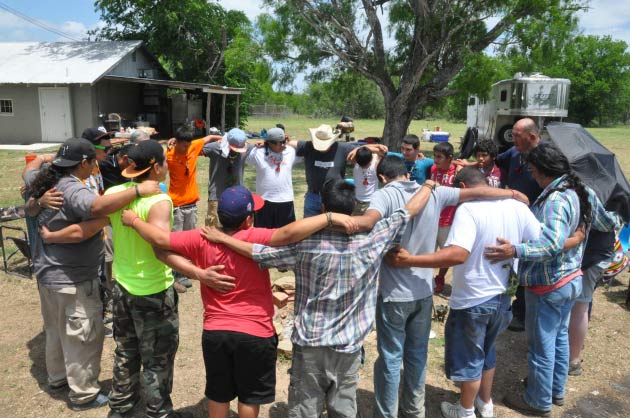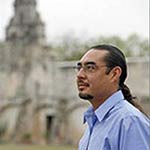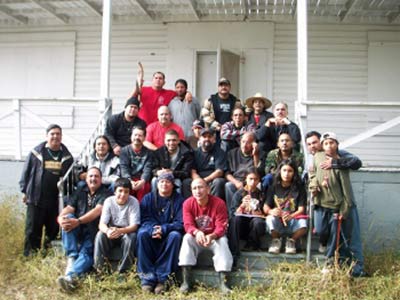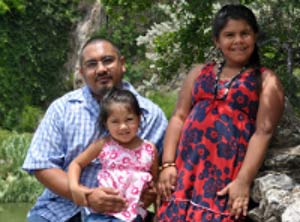
Being a father is an honor. Fatherhood calls upon men to be responsible not only to their children but also to their culture and community. That responsibility is lifelong. It is a life way.
 Ramon Juan Vasquez.At American Indians in Texas at the Spanish Colonial Missions (AIT-SCM), we see fatherhood work of the future as less likely to occur in isolated programs because the needs and concerns are broader than that. Instead, it will need to harness the interests and energies of a wide array of mentors, neighbors, community members and organizations to be available for fathers along their life paths. Services also must be more responsive to men as family members.
Ramon Juan Vasquez.At American Indians in Texas at the Spanish Colonial Missions (AIT-SCM), we see fatherhood work of the future as less likely to occur in isolated programs because the needs and concerns are broader than that. Instead, it will need to harness the interests and energies of a wide array of mentors, neighbors, community members and organizations to be available for fathers along their life paths. Services also must be more responsive to men as family members.
Overall, it is about positive change in society. Many say it is about “system” change. We at AIT-SCM are taking many steps along this path, especially with our Fatherhood Campaign which we launched in 2003.
We are called a campaign, but we are really more about a life journey. A campaign generally starts and ends. Our work does not. Being a dad does not stop, either. It does have different phases throughout life. So, we work with men at many places on their life journey to encourage and support them. This strengthens them to support their families and communities.
Fatherhood has many faces. Fathers come from cultures with strong traditions of family and community. Those cultural values are the platforms on which we build. Our work with American Indians, Latinos/Chicanos, African Americans and other groups of men emphasizes the importance of core cultural values such as respect, dignity, trust, love and pride in fatherhood.
 (Photo courtesy of American Indians in Texas at the Spanish Colonial Missions)Then, after reflection, we can focus on what society tells them about being a dad and what life skills are needed. Our approach helps men center themselves for today’s turbulent world. In this regard, our work is deeply rooted. It makes the critical distinction between “maleness” and “manhood.”
(Photo courtesy of American Indians in Texas at the Spanish Colonial Missions)Then, after reflection, we can focus on what society tells them about being a dad and what life skills are needed. Our approach helps men center themselves for today’s turbulent world. In this regard, our work is deeply rooted. It makes the critical distinction between “maleness” and “manhood.”
AIT came to focus on fatherhood while looking closely at our “Rites of Passage” program for boys and young men. In that program, we provide a view of manhood that replaces the negative images and stereotypes that are so dominant in the media and some communities. We challenge participants to rethink assumptions — both their own and those in the larger society — about what it means to be “a real man.”
We redefine the word “macho” so that it has a positive connotation. In our redefinition of the word, we are saying that a man is a teacher. He is caring. He is friendly. He is honest. He is proud to be a father. We are not all abusive. We are not all drunks. We are not all womanizers. Unfortunately, these are the stereotypes that we face. We have a mentoring component where we bring in other men who are living that redefined macho life to work with new fathers so that they have models.
In doing this work, we recognized that too many youth were exposed to negative male stereotypes and had limited parental involvement in their lives. We began to challenge young men to think about how males are perceived and how we learn or pass on behaviors and actions from those we model. These steps and this outlook will help break the cycle of poverty, educational failure, juvenile delinquency, incarceration and the despair fatherless children can experience.
We have plenty of kindling to get the fatherhood fire started. We also work with teens, divorced fathers and dads who are returning from prison. Our work is culture based. It shows American Indians, Latinos/Chicanos, African Americans and other fathers of color how to draw on the experiences embedded in their history and culture in order to become better parents.
A Letter From San Antonio, Texas

My name is Vicente Escobedo. I am a proud father of two daughters, Selena who is 11 years old and Natalie who is six years old. I am also a husband to my loving wife, Karina.
We just moved into our own home two months ago. We are both successfully employed. I would also like to inform you that I was a teen father at the age of 16. I have learned to hold these two titles with my word.
As a young father, I believed that living as a teenager came first and being a father came second. I would pick up Selena every other weekend to leave her with my parents.
I was placed on child support at the age of 17, but I refused to get a job. I refused to provide money to my child’s mother. My education was not very important either since all I did was attend different charter schools due to my criminal record.
After attending most of the charter schools in my neighborhood, I ended up at Por Vida Academy. This is where I was introduced to the San Antonio Fatherhood Campaign. Once a week, a guy would recruit a couple of dads from campus, take us out of class and feed us lunch.
He would talk about his experience in the Navy, being a dad and a husband. Most of all, he listened to what we had to say about our experience as fathers, from the arguments we had to watching our kids’ first steps. It brought out the reality of what we all were going through but refused to acknowledge.
“As a dad, you are the first man your daughter will love.”
These words are what I live by to this day, to give my word to my daughters to show them a loving man. My word to my wife is to be by her side when life is hard. Most of all, it is to hold these titles close to my heart and wear them on my shoulder.
– Vicente Escobedo
Men of color have survived historical struggles because of their reliance on their culture’s strengths. We also set out to change the mindsets of dads themselves and service providers about what men can contribute to their families and their communities, regardless of their present situation in life.
In terms of values, we try to help men understand what we consider to be traditional tribal values, as compared to Western values. A lot of this is decolonizing ourselves and our mindsets. When it comes to issues such as this, it is historical trauma. So we have to go deep.
One of the teachings that we follow is how to become more interdependent in a society that promotes independence. We stress the need to be interconnected and to understand the difference between knowledge and wisdom.
We try to help men become more balanced. We take men through an acknowledgment state. What are your values? What is your purpose? We show them that if you don’t get those two things, you get stuck in an adolescent state. We have 50-year-old men who are behaving like 13-year-old boys. They’ve never made those connections. We’ve found men who are disconnected from life. We have to find ways for them to reconnect.
Implementation of our efforts focus on the west side of San Antonio. We estimate 60 percent of males between the ages of 11 and 21 with whom we have worked either had limited or no relationship with their fathers. Many of the boys and young men lacked good concepts of manhood. For us, this includes the strong principles of spirituality, respect for history and the value of the tradition of compadrazgo —which is anetwork or extended family system of comrades and compadres.
We continue to build a collective of fathers, mothers and grandparents with support from the community. It is focused on the mission of honoring, encouraging and empowering positive male role models in the family and community through engagement. We have community councils that meet monthly to outline areas of social disparities facing fatherhood and family development. In these councils, men learn about the rights and responsibilities as they exist toward responsible fatherhood.
Father’s Day is coming up. That’s great. But for many kids, it won’t be a great day. Their fathers are not in their lives. We still have a lot of work to do. The more people we have doing this work, the better. Either you sacrifice now, or you sacrifice later. In the end, everything gets paid.
I tell my staff: “Our report card won’t come in anytime soon. Our report card comes in when we see the children of the people we’re working with today.” But pursuing this work is a dream come true. It is like one of those visions you embark on until you finally make it.
Now, it’s about keeping the fire lit.
Join us in defending the truth before it’s too late
The future of independent journalism is uncertain, and the consequences of losing it are too grave to ignore. To ensure Truthout remains safe, strong, and free, we need to raise $29,000 in the next 36 hours. Every dollar raised goes directly toward the costs of producing news you can trust.
Please give what you can — because by supporting us with a tax-deductible donation, you’re not just preserving a source of news, you’re helping to safeguard what’s left of our democracy.